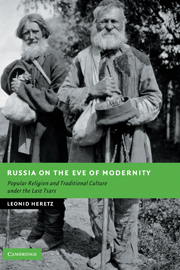Book contents
- Frontmatter
- Contents
- Acknowledgments
- Introduction
- 1 The traditional worldview
- 2 The Old Believers: modernization as apocalypse
- 3 The sectarians: dualism and secret history
- 4 Folk eschatology
- 5 The assassination of Alexander II (1881) and folk Tsarism
- 6 The year of famine and cholera (1891–1892): demonization of the nobility
- 7 The Japanese War: peasant Russia and the wider world
- 8 1905: revolution or reaction?
- 9 The Great War and the crisis of the traditional culture
- Epilogue
- Bibliography
- Index
- NEW STUDIES IN EUROPEAN HISTORY
Epilogue
Published online by Cambridge University Press: 23 December 2009
- Frontmatter
- Contents
- Acknowledgments
- Introduction
- 1 The traditional worldview
- 2 The Old Believers: modernization as apocalypse
- 3 The sectarians: dualism and secret history
- 4 Folk eschatology
- 5 The assassination of Alexander II (1881) and folk Tsarism
- 6 The year of famine and cholera (1891–1892): demonization of the nobility
- 7 The Japanese War: peasant Russia and the wider world
- 8 1905: revolution or reaction?
- 9 The Great War and the crisis of the traditional culture
- Epilogue
- Bibliography
- Index
- NEW STUDIES IN EUROPEAN HISTORY
Summary
The purpose of this work has been to illustrate and analyze the ways in which traditional elements of the Russian people understood the world and made sense of the great events of the last decades of the Old Regime. At the very least, this project has demonstrated that many Russian peasants and townsfolk had ideas about historical events that differ radically from the interpretational models developed by educated Russians of various philosophical persuasions and by Western observers. Bringing a large sampling of these notions into scholarly purview would in itself enhance the historical picture of the critical last years of the Empire, although, to be sure, adequate coverage would require monograph treatment of many of the topics touched upon here. This work also offers an analytical model for the interpretation of popular thinking in this period. I will conclude by suggesting ways in which that model might be applied to subsequent Russian history and also be useful in a comparative perspective.
IMPLICATIONS FOR RUSSIA'S HISTORICAL DEVELOPMENT
In order to function as a great power, Imperial Russia had no choice but to foster modernizing change in many aspects of life. The traditional culture it worked against was an enormous hindrance and the explanation for many shortcomings and failures, but at the same time, an immense strength, ensuring stability and submission. By the second part of the nineteenth century, the Old Regime had created its nemesis – the modern educated class.
- Type
- Chapter
- Information
- Russia on the Eve of ModernityPopular Religion and Traditional Culture under the Last Tsars, pp. 234 - 238Publisher: Cambridge University PressPrint publication year: 2008

